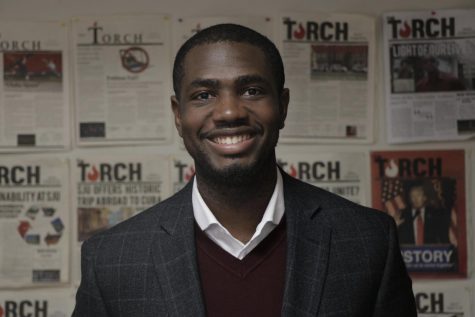Solly Walker, the first African-American basketball player in St. John’s program history, died last Friday at his home in Brooklyn. He was 85.
A native of Brooklyn and an alumnus of Boys High School, Walker scored 573 points and grabbed 496 rebounds during his career at St. John’s. During his freshman year in the 1950-1951 campaign, Walker led the freshman team to a 17-2 record, averaging just over 15 points per game.
The following year, his first on the varsity team, Walker was a catalyst in leading St. John’s to their first of two Final Four appearances in program history. During a 25-6 season, he averaged 4.4 points and 3.8 rebounds under Hall of Fame head coach Frank McGuire.
In the 1952-53 season, Walker averaged 7.0 points and 6.0 rebounds per game in helping St. John’s reach the National Invitation Tournament title game. His best season, however, was his senior year, one in which he averaged team highs in points (14.0 ppg) and rebounds (12.2 rpg).
In 1993, Walker was inducted into the St. John’s Athletic Hall of Fame.
With success on the court and acceptance from his teammates, Walker also experienced much racism and discrimination off the hardwood.
In a story by the New York Times, Walker’s sophomore campaign was highlighted by racism during a trip to Kentucky to play the Wildcats. Scheduled to play at Memorial Coliseum, Basketball Hall of Fame coach Adolph Rupp refused to let Walker play in the game.
“You can’t bring that boy down here to Lexington,” the story recounts, per a quote from Dave Anderson in a 1994 Times column.
McGuire, siding with his player, replied by telling Rupp to simply cancel the game.
Although the Wildcats won the game by 41 points, Walker still became the first black player to play against Kentucky in their gym. He was subject to endless heckling and taunting throughout the contest. He hit six of his first seven shots before leaving the game with an injury.
According to the New York Times, Solly Walker was born April 9, 1932 to Zodthous Walker and Eva Utsey in South Carolina, Walker and his family moved to Brooklyn when he was young. 18 years later, he met Minta Gillespie, whom he would marry in 1953.
Following a historic college career, Walker ventured into the world of education. Despite being drafted by the New York Knicks following his time at St. John’s, he took a position with the New York City Board of Education, where he worked with special needs-children. Walker started out as a teacher and soon served as principal of now-P.S. 35 Manhattan High School, from which he retired in 1999, the Times reported.
A public viewing was held on Monday, May 8. His life was celebrated the same day at Siloam Presbyterian Church in Brooklyn.
The New York Times also stated that Walker lived in the Clinton Hill neighborhood of Brooklyn with his wife, who was present with Walker at the time of his passing. He is survived by a brother, Thomas; two sons, Kevin and Gregory; four daughters, Debra Lesane, Cheryl Davis, Minta R. Walker and Wendy Walker; 15 grandchildren and six great-grandchildren.










